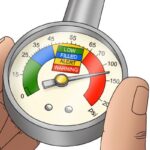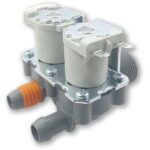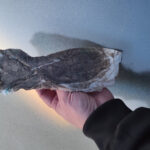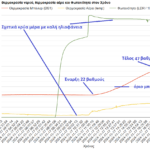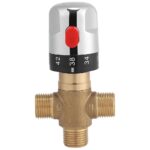Performance of solar water heater during frost period
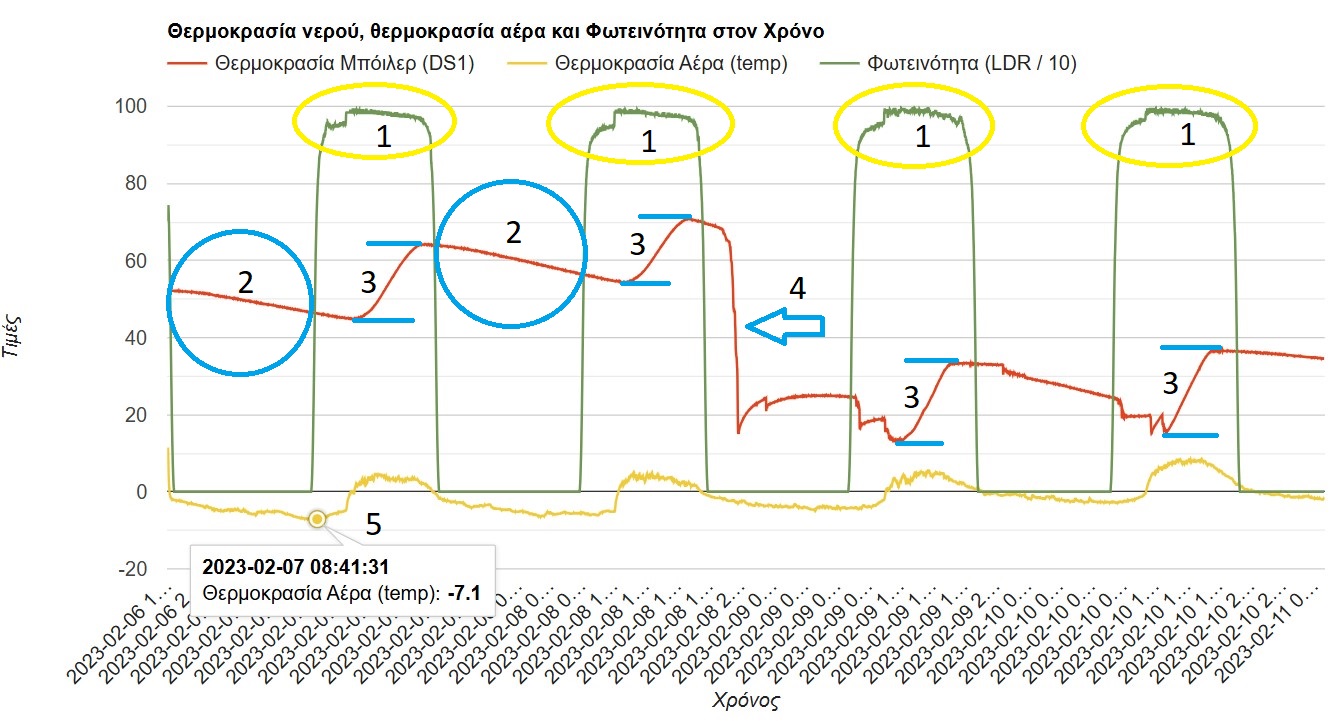
The Performance of solar water heater during frost period is something that concerns us a few days a year in Greece, but it is an existing situation during which it is proven that solar water heaters continue to perform well if there is sunshine. In this graph we see the behavior of the solar in difficult conditions. It is not a period that simply has cold weather, but a period where the temperatures at night are negative and even reach -7 degrees Celsius.
Statistical data of selected period
| Day | MIN DS1 | MAX DS1 | AVG DS1 | MIN Temp | MAX Temp | AVG Temp | MIN LDR | MAX LDR | AVG LDR |
|---|---|---|---|---|---|---|---|---|---|
| 2023-02-06 | 49.19 | 52.25 | 51 | -5.8 | 11.5 | -3.81 | 0 | 744 | 26.18 |
| 2023-02-07 | 44.81 | 64.19 | 54.55 | -7.1 | 4.6 | -2.38 | 0 | 992 | 431.88 |
| 2023-02-08 | 15 | 70.88 | 52.91 | -6.5 | 5.1 | -1.95 | 0 | 992 | 431.83 |
| 2023-02-09 | 12.69 | 33.44 | 25.62 | -4.8 | 5.5 | -0.58 | 0 | 996 | 450.25 |
| 2023-02-10 | 15 | 36.75 | 28.96 | -2.9 | 8.4 | 1.07 | 0 | 994 | 431.75 |
Detailed : 1 | 2 | 3 | 4 | 5 | Useful Information
Light Intensity Sensor LDR
1 ) From the LDR sensor data it appears that the days of the period under examination were sunny. The smooth line of the graph shows this, even if we don’t have the slightest other information about these days the values of the light intensity sensor prove it. See here what days with clouds look like.
Temperature Loss at Night
2 ) A very important element emerges from the graph. It gives an answer to the question that many solar water heater owners have about “how much does the solar lose at night with frost?” or otherwise “will I find water in the morning to take a bath?”. With the LIVE solar data all these questions can be answered easily and in a graphic – understandable way. In the graph we have two days with marking where with very cold weather (frost) during the night the water in the solar boiler lost about 7 degrees Celsius. This is one of the worst cases as the rest of the year with higher temperatures the loss is smaller. From 64 degrees to 57 in one night with -7 degrees ambient temperature is a good performance and shows that the boiler has good insulation. There are losses from other points such as the pipes, even from the collectors but the boiler is what keeps the water mass warm.
Hot Water Gain from Solar
3 ) Another question we can answer from LIVE solar data. “How much gain do we have in hot water during the day?” In this time period with almost total frost we see the pattern repeating which shows that on the worst day of the year, if there is sunshine the solar will deliver at least 20 degrees gain in hot water. This number has been observed in other articles but this period we are examining has particular significance due to total frost. If there is a colder period than this a new article will be posted. See details for the LIVE solar project here.
Intensive Hot Water Consumption
4 ) In this marking we show the intensive consumption from a family of four and its graphic representation. From “abundant” hot water (160 liters at 65 degrees on the coldest day of the year) to 16 degrees. Expected for a family with children. The important thing is that from the very next day the solar heated up again to the limit of all uses since it reached 36 degrees again.
Ambient Temperature via DHT21 Sensor
5 ) The temperature sensor is the one that shows us how cold it was during the period we are examining. We see therefore that these are the coldest days of the year and it is a representative example for the performance of solar water heater during frost period. The DHT21 sensor showed down to -7.1C.
Useful Information for Solar Behavior During Frost Period
The solar water heater is one of the most widespread water heating systems in Greece, offering economy and ecological solution. However, in periods of intense cold, with temperatures below zero for a large part of the day, its operation may be affected. Next we will examine how the solar water heater behaves in such conditions and what are the necessary actions for proper operation and protection.
Risks for the solar water heater during frost
- Water freezing in the circuit
In extremely low temperatures, the water in the pipes and collector can freeze. This can cause:- Pipe rupture due to ice expansion.
- Damage to the collector and storage tank.
- Reduced performance
Cold reduces collector efficiency, as the temperature difference between the external environment and the heated water increases, making the heating process difficult.
Types of solar water heaters and frost resistance
- Closed circuit (with antifreeze fluid): Most modern solar water heaters have a closed circuit with special antifreeze protection fluid. This fluid circulates in the collector and protects the system from freezing.
- Open circuit: In older or simpler solar water heaters, water circulates directly in the system, increasing the risk of freezing. In these cases, it is important to take additional protective measures.
Protection measures during frost periods
- Antifreeze fluid verification
Check the level and condition of the antifreeze fluid in the closed circuit. If necessary, supplement or replace it with new. - Pipe insulation
Proper insulation of pipes and collector is critical to avoid freezing. Use thermal insulation materials suitable for low temperatures. - Use of electric resistance
If the tank has electric resistance, use it to maintain water at a temperature that prevents freezing. Care is needed here as there should be flow in the hot water and the circuit should not be closed for any reason. - Avoid use during the coldest hours
If possible, prefer using the solar water heater during the day, when the temperature is slightly higher.
What to do in case of freezing
If you find that the system has frozen:
- Do not attempt to unfreeze it with hot water or fire. This can cause serious damage.
- Turn off the electric resistance, if present.
- Contact a specialized technician to restore system operation.
Conclusion
The solar water heater can operate effectively even during frost periods, provided that appropriate protective measures have been taken. Invest in a system with closed circuit and antifreeze fluid, ensure proper insulation and perform regular checks to ensure smooth operation. This way, you will enjoy hot water even in the most difficult weather conditions.
- Improvements in the Placement of the Data Logger - 29 January 2025
- Solar Water Heater Statistics – December 2024 - 10 January 2025
- Washing machines with dual water supply - 24 December 2024



